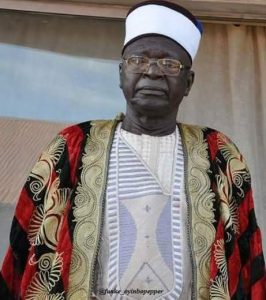It was the Ghanaian writer, Ama Atta Aidoo who declared that though she does not know whether ghosts exist, she nevertheless fears them. So also is it for even the most educated Idoma Nigerian: s/he might not know whether ancestors (‘Alekwu’) exist or not but s/he fears ancestors. So, when an Abuja court declared the ancestor decreed practices on divorce out of order, it was bound to provoke reactions as can be seen in this shot from Dr. Alleh. Who knows how many more shots will be fired on the issue? Read on!
By Alleh Okpeh Alleh (PhD)
Court Declares Idoma Adultery Deity ‘Alekwu’ Repugnant, Unconstitutional. So ran the headline on many social and traditional media platforms in Nigeria Monday, February 11th, 2022. It was the reporting of a decision of a customary court in Pyakasa, Abuja’s that the ‘Alekwu” tradition of the Idoma people in Nigeria’s middle belt is repugnant to natural justice, equity and good conscience and, therefore, illegal and unconstitutional. Although the details before the court are still being sought, a good student of jurisprudence should still be able to situate that judicial pronouncement in its wider historical and cultural context. And that is what is being attempted here.
In the particular report by one Ameh Jazzia-Becky, a sentence there goes as follows: “A customary court in Pyakasa, FCT has declared the Idoma tradition of denying women the right to divorce, repugnant to natural justice, equity and good conscience”. Striking is the contrast between it and the headline: meanwhile the main caption of the story is “Court Declares Idoma Adultery Deity, ‘Alekwu’ Repugnant, Unconstitutional” I am a bit curious on the contrast because, as an Idoma and a lawyer of fairly good number of years, I know there is no culture in Idoma that stops a woman from either seeking or getting divorce in the Idoma marriage system.

Tradition and modernity in the case of the consumption of palm wine in much of Idomaland
But more of the contrasts were buried in the reporting, especially where it was written ‘Another practice that was struck down seek(s) to compel husbands to ‘return’ their wives to the wives’ ancestral home in Igumale before a divorce could become final……non compliance with the demands would incur the wrath of ‘Alekwu’, a vicious deity that punishes adultery by killing the children and husbands of women who commit adultery’. The report went further to say ‘ the court held that “ a custom which does not permit the economic, social, political growth of the people is contrary to the rule of natural justice, equity and good conscience …every woman in Nigeria has the right to enter into marriage and a corresponding right to exit any marriage’. Going through the report and the content of the judgment as reported, it is surely quite confusing and could make a non Idoma scholar to have jaundiced interpretation of what the culture could be.
Among the sources of law applying in Nigeria’s judicial system in tandem with Commonwealth jurisprudence is the Received English Law and what is called the Statute of General Application. This system recognized the domestic traditions of the people except that which a competent court declares to be ‘repugnant to natural justice, equity and good conscience’. An example is giving a child to another man simply because the woman isn’t married to the biological father or denying female child the right to inherit from her father simply because she is female or refusing that a child takes blood transfusion in a life threatening circumstances on the ground of religion, unless an adult who can take decision by himself’
Before the court takes decision on these, it takes into consideration the sociology of the tradition and how it impacts on the conscience of the rational man in the street as to whether it is naturally prudent.
In Idoma tradition, the Alekwu in this context is not a deity but the spirit of the ancestors which acts as the watchdog in the maintenance of moral standards among the people in the community in all cases and irrespective of whether one is an indigene or not in some cases. These spirits of the ancestors that are invisible, abhors all acts that are regarded as taboo in the land such as murder, incest, fornication, adultery, bringing and or using charms harmful to the community, false allegation and or witnessing falsely against another, stealing and such other acts that are contrary to laid down norms, traditions, morals established for the good governance, security and peace of the community.

The immediate past Och’Idoma of Idoma, Agaba Idu Ikoyi Obekpa while the Idoma await formal inauguration of a new Chief hunter and guardian of orthodoxy
In the matter of marriage among and within the confines of the Idoma culture, any woman who is married to an Idoma man automatically comes under the oath of the ‘Alekwu’ culture which checks her loyalty and fidelity to the marriage. In this culture, the wife is strictly prohibited from committing adultery or having illicit relationship with another man except her husband. If a wife commits any of these offences, and is not known to the man, the woman risks the sanction of unconventional sickness that could lead to her death, sudden death of children in the family, or inexplicable happenings in the home including misfortunes or ill lucks hovering around the life of the man. This can only be reversed if confession is made at the right time by the woman, and cleansing is made by appeasing the ancestors with the appropriate sacrifices which may include making payment as compensation to the man and spilling an animal blood to cleanse the abomination.
But if the offence is known to the man but he couldn’t muster the courage to challenge the woman or the incidents as a whole, he is either bailed by his relations who would challenge the circumstances or he risks losing his life as the ancestors’ will surely kill him or make him useless in life. In all situations, if confession is made at the right time, the dangers or damages can be arrested. Most families under this spell usually lacks peace in the home.
There are other rules of ‘Alekwu’ around marriage such as complete disclosure of her life matters by the wife to the man and similar other things also from the side of the man. Some of these are not appropriate stuff for discussions.
Very many scholars or students of activism on gender, feminism, human and democratic rights have severally argued that the tradition is discriminatory against women but the counter argument is that it is not only in Idoma culture that matters of infidelity is weighed against women. In fact, according to some authorities, all cultures and religion, from Islam to Christianity to the African religion, permit some level of sexual expansion on the part of man, including the act of polygamy. So, to say that the ‘Alekwu’ culture of the Idoma people is peculiarly anachronistic, discriminatory and repugnant to natural justice, equity and good conscience is debatable as only very few cultures permit adultery in contrast to the volume that abhors same.

Some senior citizens of Idoma identity
The other side of the judgment by the court that the Idoma tradition does not permit a woman to seek divorce, my reaction is completely the opposite. Among the Idoma, there are laid down processes and procedure to enter into a marriage as there are same for the processes and procedures for divorce. Every divorce is expected to commence after several processes of reconciliation and negotiation especially anchored or followed by the mediator of the marriage called the middle man who is regarded as the custodian of the marriage from the onset has been exhausted. Where every effort at keeping the marriage fails, the woman is given to the middle man to take to the family as the marriage is assumed to have failed. And even after this, the relationship is still open to discussions. Perhaps, that is what the court meant by ‘taking the wives to the wives’ ancestral home in Igumale’. Of course marriages are not contracted on the road and no natural justice, equity and good conscience would have expected that a divorce could be executed on the road.
Thus, even in conventional English matters that are not customary, there is the principle of jurisdiction which may include place of occurrence or the object of the subject matter to be decided upon by the court. In such circumstances, a marriage that is properly contracted in accordance with the Idoma cultural norms and tradition at Igumale may not be competently handled and decided upon for the purpose of a successful divorce at a Pyakasa court in FCT. It is like a PDP primary election held in Awka in Anambra having its case decided upon in a High Court in Zamfara. Thus the puzzle in the Honourable court being reported as declaring that the Idoma culture denies women the right to divorce. I humbly submit that I cannot beg to disagree that the position is simply not an appropriate one.
The Idoma culture may have placed some blocks on the way of divorce but that too is not a peculiar cultural practice. In English marriage, there are periods within which you are not permitted to initiate divorce process and even when it is due, you must satisfy the court that every effort aimed at stabilizing the marriage had been exhausted and that they all failed. Among the Idoma and for a successful divorce process, the woman is expected to return her bride price which many have criticized as being draconian, primitive and inequitable. But the principle behind this tradition is that, that is the only way the woman will be relieved of the scrutinizing gaze of the ‘Alekwu’ world, meaning that the payment frees here from moral liabilities that are no longer justifiable after divorce. The practice finds justification in the Idoma world out in how it is safer for the woman to return the dowry since the ancestors cannot be taken to court and since nobody knows how they operate. At any rate, most times, it is not the exact dowry that is returned. What is returned nowadays may be no more than One Naira. The payment is more symbolic than anything else and the ceremony is concluded. Critics of this practice thus need to understand the spirit of the convention because, assuming a court holds that returning the dowry is inequitable and the man is asked to go home empty handed, on whom will the judgment be served and executed? There are also circumstances where the lack of capacity to return the dowry has waged on the divorce process and on a long run, the marriage stabilizes. It could be that the elders who coined this culture into the process may have equally assumed that it could work against unreasonable process of speedy divorce.
Many right activists or gender student and feminists may argue that it is against the right of the woman to divorce or that the practice of returning the dowry could keep a woman in a marriage against her choice, wish or conscience but we must agree that majority of marriages today are sustained against the wishes of the party, most of whom decide to hold on to it for whatever it is worth.
Dr. Alleh Okpeh Alleh Esq wrote in from the University of Abuja and is accessible via allehokpeh@gmail.com



























